- Home
- Tobias Wolff
The Barracks Thief Page 2
The Barracks Thief Read online
Page 2
The next morning Philip got up early and took a bus downtown. The Marine recruiting office was closed. He wandered around, and when it still hadn’t opened two hours later he walked up the street and enlisted in the Army. That night, when he knew his mother would be at work, he called home from Fort Lewis. At first Keith thought he was joking. Then the idea took hold. “You’re really in the Army,” he said. “What a trip. Jesus. Well, good luck. I mean that.”
Philip could tell he was serious. It touched him, and he did something he came to regret. He gave Keith his car.
2
Five months later Keith disappeared. I was in jump school at Fort Benning when it happened, at the tail end of a training course that proved harder than anything I had ever done.
When I got the message to call home we had just come back from our third of five parachute jumps. We’d been dropped after a heavy rain and landed in mud to our ankles, struggling against a wind that pulled us down and dragged us through a mess of other men, scrub pine, tangled silk and rope. I was still spitting out mud when we got back to camp.
My mother told me that Keith had been gone for three days. He had left no message, not even a good-bye. The police had a description of the car and they’d talked to his friends, but so far they seemed no closer to finding him. We agreed that he had probably gone to San Francisco.
“No doubt about it,” I said. “That’s where all the losers are going now.”
“Don’t take that tone,” she said. “It breaks my heart to hear you talk like that. Is that what you’re learning in the Army?”
It had started to rain again. I was using an unsheltered pay phone near the orderly room, and the rain began to melt the caked mud on my uniform. Brown streams of it ran off my boots. “What do you want me to do?” I asked.
“I want you to go to San Francisco and look for Keith.”
I couldn’t help laughing. “Now how am I supposed to do that? This is Georgia, remember?”
“I’ve talked to a man at the Red Cross,” she said. “You could get an emergency leave. They’ll even lend you money.”
“That’s ridiculous,” I said, though I realized what she was saying was true. I could go on leave. But I didn’t want to. It would mean missing the last two jumps, dropping out of the course. If I came back I would have to start all over again. I doubted I had the courage to do that; jump school was no day at the beach and I’d only made it this far out of ignorance of what lay ahead. I wanted those wings. I wanted them more than anything.
And if I did go, where would I look? Who would help me in San Francisco, me with my head shaved to the bone in a city full of freaks?
“You have to,” she said. “He’s your brother.”
“I’m sorry,” I told her. “It’s just not possible.”
“But he’s so young. What is happening to us? Will somebody please tell me what is happening to us?”
I said that the police would find Keith, that he’d be glad to get home, that a taste of the real world would give him a new angle on things. I didn’t believe what I was saying, but it calmed her down. Finally she let me go.
On our last jump, a night jump in full field equipment, a man was killed. His main chute didn’t open. I heard him yell going down but it only lasted a moment and I paid no attention. Some clown was always yelling. It ended and there was no sound save the rhythmic creaking of my shoulder straps. I felt the air move past my face. The full moon lit up the silk above me, above the hundred other men falling in silence overhead and below and all around me. It seemed that every one of us fell under his own moon. Then a tree stabbed up to my right and I braced and hit the ground rolling.
The dead man was carried to the side of the road and left there for the ambulance. They didn’t bother to cover him up. They wanted us to take a good look, and remember him, because he had screwed up. He had forgotten to pull his reserve parachute. As our truck went past him a sergeant said, “There’s just two kinds of men in this business—the quick and the dead.”
The fellow across from me laughed. So did several others. I didn’t laugh, but I felt the impulse. The man lying by the road had been alive an hour ago, and now he was dead. Why did that make me want to smile? It seemed wrong. Someone was passing around a number. I took a hit and gave it to the man next to me. “All right!” he said. “Airborne!”
Two black guys started a jump song. I leaned back and looked up at the stars and after a while I joined in the song the others were singing.
3
After jump school I was sent to the 82nd Airborne Division at Fort Bragg. Most of the men in my company had served together in Vietnam. Like the Marines I’d known in Bremerton, they had no use for outsiders. I was an outsider to them. So were the other new men, Lewis and Hubbard. The three of us didn’t exist for the rest of the company. For days at a time nobody spoke to me except to give me orders. Because we were the newest and lowest in rank we got picked to pull guard duty on the Fourth of July while everyone else scattered to Myrtle Beach and the air-conditioned bars in Fayetteville.
That’s where I’d wanted to spend the Fourth, in a bar. There was one place in particular I liked. Smitty’s. They had a go-go dancer at Smitty’s who chewed gum while she danced. Prostitutes, Fayettecong we called them, gathered in the booths with pitchers of beer between them. Car salesmen from the lots down the street sat around figuring out ways to unload monster Bonnevilles on buck privates who made seventy-eight dollars a month before taxes. The bartender knew my name.
The last way I wanted to spend my Fourth was pulling guard with Lewis and Hubbard. We had arrived on the same day and avoided each other ever since. I could see that they were as lonely as I was, but we kept our distance; if we banded together we would always be new.
So when I saw the duty roster and found myself lumped together with them it made me bitter. Lewis and Hubbard were bitter, too. I could feel it in the way they looked at me when I joined them outside the orderly room. They didn’t greet me, and while we waited for the duty officer they stared off in different directions. It was late afternoon but still steaming. The straight lines of the camp—files of barracks, flagpoles, even the white-washed rocks arranged in rows—wavered in the heat. Locusts sawed away in frantic bursts.
Lewis, gaunt and red-faced, began to whistle. Then he stopped. Our uniforms darkened with sweat. The oil on our rifles stank. Our faces glistened. The silence between us grew intense and I was glad when the first sergeant came up and began to shout at us.
He told us that we were little girls, piglets, warts. We were toads. We didn’t belong in his army. He lined us up and inspected us. He said that we should be court-martialed for our ugliness and stupidity. Then he drove us to an ammunition dump in the middle of a pine forest thirty miles from the post and made us stand with our rifles over our heads while he gave us our orders and filled our clips with live rounds. We were to patrol the perimeter of the ammunition dump until he relieved us. He didn’t say when that would be. If anyone so much as touched the fence we should shoot to kill. Shoot to kill, he repeated. No yakking. No grabass. If we screwed up he would personally bring grief upon us. “I know everything,” he said, and he ordered us to run around the compound with our rifles still over our heads. When we got back he was gone, along with the three men whose places we had taken.
Lewis had the first shift. Hubbard and I sat in the shade of an old warehouse weathered down to bare gray boards with patches of green paint curling off. It had no windows. On the loading ramp where we sat two sliding doors were padlocked together and plastered with prohibitions, No Smoking and so on, with a few strange ones thrown in, like No Hobnailed Boots.
There were five other buildings, all in bad repair. Weeds grew between the buildings and alongside the chain-link fence. In places the weeds were waist-high. I don’t know what kind of ammunition was inside the buildings.
Hubbard and I put our ponchos under our heads and tried to sleep. But we couldn’t lie still. Gnats crawled up our noses. Mo
squitoes hung in clouds around our heads. The air smelled like turpentine from the resin oozing out of the trees.
“I wish I was home,” Hubbard said.
“Me too,” I said. There didn’t seem to be much point in ignoring Hubbard out here, where nobody could see me do it. But the word “home” meant nothing anymore. My father was in Southern California, looking for work. Keith was still missing. The last time I’d spoken to her my mother’s voice had been cold, as if I were somehow to blame.
“If I was home,” Hubbard said, “I’d be out at the drags with Vogel and Kirk. Don’t ask me what I’m doing here because I sure don’t know.” He took off his helmet and wiped his face with his sleeve. He had a soft, square face with a little roll of flesh under his chin. It was the face he’d have for the rest of his life. “Look,” he said. He took out his wallet and showed me a picture of a ’49 Mercury.
“Nice,” I said.
“It isn’t mine.” Hubbard looked at the picture and then put it away. “I was going to buy it before Uncle got me. I wouldn’t race it, though. I’d take it out to the track and sit on the hood with Vogel and Kirk and drink beer.”
Hubbard went on talking about Vogel and Kirk. Then he stopped and shook his head. “How about you?” he asked. “What would you be doing if you were home?”
“If I were home,” I said, remembering us all together, “we would drive up to the fair at Mount Vernon. Then we’d have dinner at my grandfather’s place—he has this big barbecue every year—and afterwards we’d stay in a motel with a swimming pool. My brother and I would swim all night and watch the fireworks from the water.”
We had not been to Mount Vernon since my grandfather died when I was fourteen, so the memory was an old one. But it didn’t feel old. It felt fresh and true, the starry night, the soft voices from the open doorways around the pool, the water so warm you forgot about it, forgot your own skin. Shaking hands with Keith underwater and looking up from the bottom of the pool at the rockets flaring overhead, the wrinkled surface of the water all ashimmer with their light. My father on the balcony above, leaning over the rail, calling down to us. That’s enough, boys. Come in. It’s late.
“You like it, don’t you?” Hubbard asked.
“Like what?”
“All this stuff. Marching everywhere. Carrying a rifle. The Army.”
“Come off it,” I said. I shook my head.
“It’s true,” he said. “I can tell.”
I shook my head again but made no further denials. Hubbard’s admission that the car in the picture wasn’t his had put me in an honest mood. And I was flattered that he had taken the trouble to come to a conclusion about me. Even this one. “The Army has its good points,” I said.
“Name me one.” Hubbard leaned against the ramp. He closed his eyes. I could hear Lewis whistling as he walked along the fence.
I couldn’t explain why I liked the Army because I didn’t understand the reason myself. “Travel,” I said. “You can go all over the world.”
Hubbard opened his eyes. “You know where I’ve been to? South Carolina, Georgia, and North Carolina. All I’ve seen is a lot of hicks. And when they do send us overseas it will just be to kill slopes. You know the first sergeant? They say he killed over twenty of them. I could never do that. I shot a squirrel once and cried all night.”
We talked some more and Hubbard told me that he hadn’t been drafted, as I’d assumed. Like me, he had enlisted. He said that the Army had tricked him. They’d sent a recruiter to his high school just before graduation to talk to the boys in Hubbard’s class. The recruiter got them together in the gym and ran movies of soldiers being massaged by girls in Korea, and drinking beer in Germany out of steins. Then he visited the boys in their homes and showed each of them why the Army was the right choice. He told Hubbard that anyone who could drive a tractor automatically got to drive a tank, which turned out not to be true. Hubbard hadn’t even set foot in a tank, not once. “Of course he didn’t mention Vietnam,” Hubbard said.
When I asked Hubbard what he was doing in the Airborne he shrugged. “I thought it might be interesting,” he said. “I should have known better. Just more of the same. People running around yelling their heads off.”
He waved his hand through a swarm of mosquitoes overhead. “We’ll be getting orders pretty soon,” he said. “Are you scared?”
I nodded. “A little. I don’t think about it much.”
“I think about it all the time. I just hope I don’t get killed. They can shoot my dick off as long as they don’t kill me.”
I didn’t know what to say. The sound of Lewis’s whistling grew louder.
“Nuts,” Hubbard said. “I don’t know what he’s so cheerful about.”
Lewis came around the corner and climbed the ramp. “Shift’s up,” he said. “Best watch how you go along that fence. There’s nettles poking through everyplace.” He held out his hand for us to see. It was swollen and red. He leaned his rifle against the warehouse and began to unlace his boots.
“I’m allergic to nettles,” Hubbard said. “I could die out there.” He stood and put on his helmet. “Wish me luck. If I don’t make it back tell Laura I love her.”
Lewis watched Hubbard go, then turned to me. “I never saw so many bugs in my life,” he said. “Wish I was at the beach. You ever been to Nag’s Head? Those girls up there just go and go.”
“Never been there,” I said.
“I had one of those girls almost tore my back off,” Lewis said. “Still got the marks.” He leaned towards me and for a moment there I thought he was going to take his shirt off and show me his back as he’d shown me his hand.
“Ever been to Kentucky?” he asked.
I shook my head.
“That’s where I’m from. Lawton. It’s a dry town but I’ve been drinking since I was thirteen. Year after that I started on intercourse. Now it’s got to where I can’t go to sleep anymore unless I ate pussy.”
“I’m from Washington,” I said. “The state.”
Lewis took off his helmet. He had close-cropped hair, red like his face. He could have worn it longer if he’d wanted, now that we were out of training. But he chose to wear it that way. It was his style.
He studied me. “You never been to Lawton,” he said. “You ought to go. You won’t want to leave and that’s a guarantee.” He took off one of his socks and started doing something to his foot. It seemed to require all his concentration. He sucked in his long cheeks and stuck the tip of his tongue out of the side of his mouth. “There,” he said and wiggled his toes. “I guess you know about what happened the other day,” he said. “It wasn’t the way you probably heard.”
I didn’t know what Lewis was talking about, but he gave me no chance to say so.
“I just didn’t have the rope fixed right,” he said. “I wasn’t afraid. You ought to see me go off the high dive back home. I wanted to straighten out the rope was all.”
Now I understood. Our company had practiced rappelling the week before off a fifty-foot cliff and someone had refused the descent. I’d heard the first sergeant raising hell but I was at the base of the cliff and couldn’t make out what he was saying or see who he was yelling at.
“He called me Tinkerbell,” Lewis said.
“He calls everybody that,” I said. He did, too. Tinkerbell and Sweety Pie.
“You go ask around home,” Lewis told me. “Just talk to those girls back there. They’ll tell you if I’m a Tinkerbell.”
“He didn’t mean anything.”
“I know what he meant,” Lewis said, and gave me a fierce look. Then he put his sock back on and stared at it. “What’s the matter with these fellows here, anyway? Pretty stuck on themselves if you ask me.”
“I guess so,” I said. “Look, don’t mind me. I’m going to get some sleep before my shift.” I closed my eyes. I hoped that Lewis would be quiet. He was starting to get on my nerves. It wasn’t just his loud voice or the things he said. He seemed to want something from me.<
br />
“There’s not one of these fellows would last a day in Lawton,” he said. “We’ve got a guard in the bank that bit a man’s tongue out of his head.”
I opened my eyes. Lewis was watching me. “It’s just because we’re new,” I said. “They’ll be friendlier when we’ve been around for a while. Now if you don’t mind I’m going to catch some sleep.”
“What burns me,” Lewis said, “is how you meet one of them in the PX or downtown somewhere and they look past you like they never saw you.”
Off in the distance a siren wailed. The sound was weak, only a pulse in the air, but Lewis cocked his head at it. He squinted. When the siren stopped Lewis held his listening attitude for a moment, then gave a little shake. “I’m just as good as them,” he said. “Look here. You got family?”
I nodded.
“I’m the only one left,” Lewis said. “It was me and my dad, but now he’s gone too. Heart attack.” He shrugged. “That’s all right. I get along just fine.”
Another siren went off, right in my ear it seemed. The sound made me wince. Then everything went quiet. Lewis’s eyes were pink.
Hubbard came around the side of the building and started up the ramp. I was glad to see him. He waved and I waved back. He gave me an odd stare then and I realized he’d only been flapping mosquitoes out of his face.
“There’s a man out by the gate who wants to talk to us,” he said.
Lewis started lacing up his boots. “Officer?”
Hubbard shook his head. “Civilian.”
“What does he want?” I asked, but Hubbard had already turned away. I followed him and Lewis came after me, muttering to himself and trying to tie his boots.
There was a car parked in the turn-around outside the gate. It had a decal on the door and a red blinker flashing on top, dim in the gray light of early evening. A man was sitting in the front seat. Another man leaned against the fence. He was tall and stooped. He wiped at his face with a red bandana which he put in his back pocket when he saw us coming.

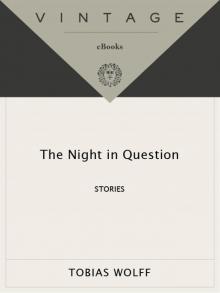 The Night in Question: Stories
The Night in Question: Stories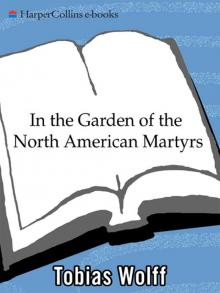 In the Garden of the North American Martyrs
In the Garden of the North American Martyrs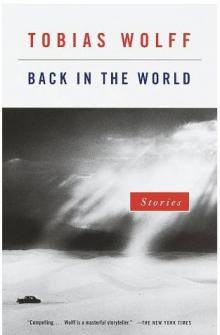 Back in the World: Stories
Back in the World: Stories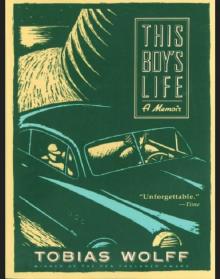 This Boy's Life
This Boy's Life Old School
Old School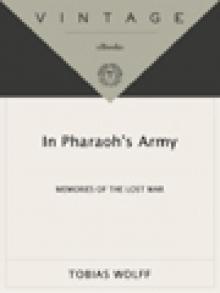 In Pharaoh's Army: Memories of the Lost War
In Pharaoh's Army: Memories of the Lost War Our Story Begins: New and Selected Stories
Our Story Begins: New and Selected Stories The Barracks Thief
The Barracks Thief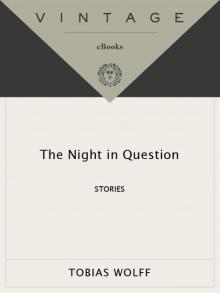 The Night In Question
The Night In Question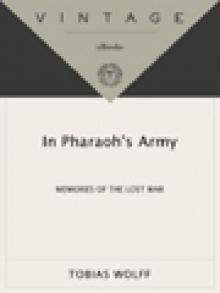 In Pharaoh's Army
In Pharaoh's Army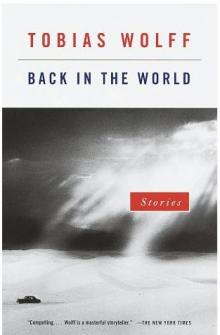 Back in the World
Back in the World